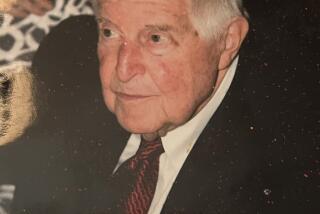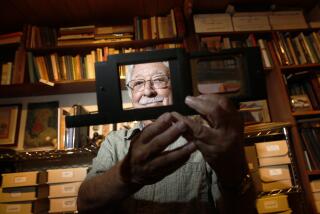Richard Milanovich dies at 69; Agua Caliente Band chairman
Richard Milanovich, who as chairman of the Agua Caliente Band of Cahuilla Indians helped to usher in a new age of wealth and political muscle for many Native Americans through the expansion of tribal casinos in California, died Sunday at Eisenhower Medical Center in Rancho Mirage. He was 69 and had cancer.
During Milanovich’s nearly three decades as chairman, the Agua Caliente tribe rose from a harsh desert existence to the glitz and riches that accompany casino-fed wealth. The transformation coincided with the rebirth of Palm Springs, home to one of the tribe’s two posh casino resorts and large swaths of tribal land, and economic gains across the checkerboard reservations in the Coachella Valley.
“Richard never forgot where we came from and how difficult it was for all of us before gaming,” said longtime friend Lynn Valbuena, vice chairwoman of the San Manuel Band of Serrano Mission Indians. “He worked very hard to get his tribe on its feet and do very well, and he did the same for many other tribes in California.”
Milanovich, a familiar face in Washington, Sacramento and local city halls, earned a reputation as both an accommodating and outspoken leader.
Gov. Jerry Brown on Monday praised Milanovich’s accomplishments, saying that he “reshaped his community, helped preserve its rich heritage and left a legacy that lives in the thousands of lives he touched. Richard was a good friend, and he will be missed.”
Under Milanovich’s tenure, the Agua Caliente tribe became one of the first California tribes to abide by many local land-use restrictions, even when building on their sovereign lands. Milanovich was just as quick to confront. During a heated campaign to unionize the tribe’s casinos in 2003, he called a priest protesting in front of tribal headquarters a “common thug.”
The Agua Caliente tribe poured more than $49 million into California political campaigns from 2000-10, enough for the Fair Political Practices Commission to label the tribe as one of the top 10 “wealthy special interests” in the state. The vast majority of the money supported ballot measures to expand gambling, including more than $20 million for four propositions in 2008 that allowed four tribes to add thousands of new slot machines, including Agua Caliente’s casinos in Palm Springs and Rancho Mirage.
“Richard had tremendous influence politically up and down the state, in D.C. as well,” said former Republican state Sen. Jim Battin of La Quinta. “It was earned by his good will and genuine sincerity … but he also was committed to his point of view. And was willing to act.”
Battin said the best example of that was in 1999, when Gov. Gray Davis and 57 Indian leaders signed accords to expand gambling operations on reservations and allow them to include Nevada-style slot machines and card games, with state regulatory oversight. Milanovich initially opposed the deal, arguing that tribes were ceding their sovereignty to the state, and threatened to launch a ballot initiative that would grant tribes rights to operate as they see fit. The tribe eventually agreed to sign after the governor agreed to some minor revisions, benefiting all tribes.
“A lot of the tribes got mad at them because there was so much at stake,” Battin said. “But the Agua Calientes felt they needed more security.”
Milanovich, one of the few Republicans leading a California tribe, believed that the money that gambling provided would allow Native Americans to take their “rightful place” on the political stage and give members the ability to pursue the hopes and dreams that had been imprisoned on impoverished reservations for generations.
But he never saw casino profits as a panacea.
“It’s not our end goal,” Milanovich told The Times in 1990. “We know gaming won’t last. The laws will change at some point. But it’s a means to an end. It has brought us sorely needed revenue which has allowed us to diversify even more, so the future of the tribe is secure.
“But that doesn’t mean that tribal members should simply get more money” as casino profits rise. “They will still have to become viable, working members of society.”
Milanovich challenged tribal members to look beyond comfortable lifestyles, professing the values of a strong work ethic and the need to give back to the community.
“He was a role model. I didn’t really have a Native American male figure in my life, and the chairman was someone I looked up to,” said Jeff L. Grubbe, tribal vice chairman. “He was the only chairman that I’ve ever known.”
The son of a steelworker of Yugoslavian descent, Milanovich was born Dec. 4, 1942, shortly after his father was shipped overseas with the Army in World War II. After his parents divorced, he was raised by his mother, LaVerne Saubel, an influential member of an Agua Caliente all-female tribal council that persuaded Congress in 1957 to pass legislation allowing the tribe to govern itself.
Milanovich joined the Army at 17, serving 2 1/2 years in Germany and as a tracker on long-range reconnaissance patrols. After his discharge, he returned to Los Angeles, where, among other things, he sold vacuum cleaners and encyclopedias door to door. He first joined the tribal council in 1978, when he was 35.
In 1992, as tribal chairman, Milanovich persuaded the tribal council to buy the decrepit Spa Hotel in downtown Palm Springs, which a developer had built on leased reservation land three decades before. The wisdom of that purchase wasn’t fully realized until a few years later, when a growing number of tribes in California were opening casinos without state or federal permission, and making a bundle.
In 1995, the tribe opened what is now the Spa Resort Casino and, six years later, the Agua Caliente Casino in Rancho Mirage.
“He was wise, he was humorous, he always had a twinkle in his eye,” said Michael Hammonds, executive director of the Agua Caliente Cultural Museum. “But the legacy of his career will be turning the tribe into an economic power.”
Milanovich is survived by his wife of nearly 35 years, Melissa, and six children.
More to Read
Start your day right
Sign up for Essential California for the L.A. Times biggest news, features and recommendations in your inbox six days a week.
You may occasionally receive promotional content from the Los Angeles Times.




















































